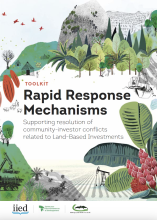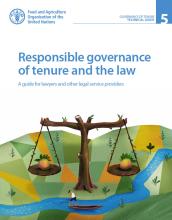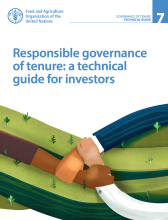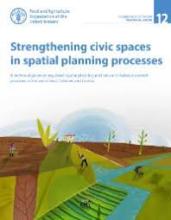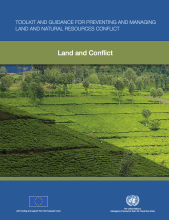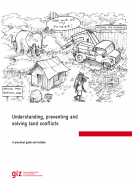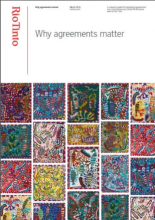Resources for Conflict resolution
Rapid Response Mechanisms: Supporting resolution of community-investor conflicts related to Land-Based Investments
Often, approaches to investment-related land rights violations are reactive, rather than proactive and preventative: legal support is usually provided after communities have been negatively impacted, displaced or evicted — and after lives have been lost, property destroyed, local waters and soils polluted, and communities devastated. In such cases, legal support has a limited chance of reversing the damage caused.
To address this challenge, rapid response mechanisms (RRMs) are designed to ensure that community members can reach out for legal and technical help the moment a conflict arises, and/or as soon as their rights are threatened or violated — and for advocates to respond quickly, in order to preventatively resolve a potential conflict before major harm has been done and before it escalates.
This toolkit, based on direct field experience, provides guidance on how advocacy organisations might create rapid response mechanisms in a wide range of contexts.
Responsible governance of tenure and the law - A guide for lawyers and other legal service providers
This guide is aimed at legal professionals working with governments, civil society, the private sector or development agencies as well as law societies, notaries, judges and all those who are interested in understanding the role of law in giving effect to the provisions of the Guidelines (VGGT). The VGGT provide important elements for shaping a well-functioning legal framework to facilitate their effective implementation at the national level. The technical guide reviews the legal implications of the VGGT and provides guidance on assessing national legislation, legal reform and improved implementation as well as the settlement of disputes
Responsible governance of tenure: a technical guide for investors
This document provides guidances on how businesses can respect legitimate tenure rights and human rights in their land-based investments. It
• translates principles of responsible land governance and tenure (see the VGGT) into practical mechanisms, processes and actions,
• gives examples of good practice – what has worked, where, why and how, and
• provides useful tools for activities such as the design of policy and reform processes, for the design of investment projects and for guiding interventions.
Strengthening civic spaces in spatial planning processes
This technical guide provides strategies on how to strengthen, protect and promote legitimate tenure rights in spatial planning processes at the local, regional and national levels. It addresses state authorities involved in spatial planning processes, national governments and local authorities, and those operating on behalf of the state or within customary governance systems.
Toolkit and Guidance for Preventing and managing Land and Natural Resources Conflict - Land and Conflcit
This guidance note provides a framework for understanding and addressing land and natural resource-related grievances and conflicts through a holistic, systematic approach. While the main emphasis is on violent conflict, it may also be useful in a variety of other situations characterized by significant land-related grievances, but which are not currently or openly violent. It is intended for staff of multilateral organisations, national and local governments, and civil society organisations.
Understanding, preventing and solving land conflicts: A practical guide and toolbox
This guide is intended for practitioners who are confronted with land conflicts in the course of their work or are in a position to prevent them and/or include land governance as one pillar in their policies. It aims to broaden the understanding of the complexity of causes that lead to land conflicts in order to provide for better-targeted ways of addressing such conflicts, and provides a number of tools with which to analyse land disputes. In addition, this guidebook discusses a wide variety of options and tools for settling ongoing land conflicts and for preventing new ones. It adopts a gender-sensitive approach.
Why agreements matter
The guide has been produced to help practitioners, project and operational managers understand the drivers, implications and capabilities needed to make and implement agreements.


